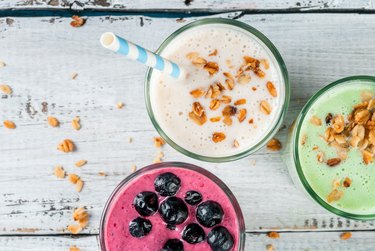
Being sick can wreak havoc on your appetite and your ability to stay properly nourished. But when you're ailing it's the most important time to give your body a variety of nutrients and extra calories. Your immune system is working overtime to fight off the bug you caught and needs energy from healthy foods to keep it going. If you're a fitness enthusiast who takes protein shakes to support muscle growth, keep it up while you're sick so you don't fall off track with your goals. The only exception is if you're experiencing vomiting or diarrhea and can't keep down solid foods.
Tip
If you're appetite is poor and you're fighting off an illness, a protein shake can give your body what it needs to help you recover.
Video of the Day
Protein and Your Immune System
Proteins are often referred to as the building blocks of life. There are over 10,000 different proteins that form and maintain your body. The compounds that make up proteins are called amino acids, and they are crucial for a healthy immune system. A deficiency in protein or in any of the amino acids can negatively affect immune function.
Video of the Day
Essential, Nonessential and Conditional Amino Acids
There are 21 amino acids required by your body to support cell growth and healthy immune function. They're classified as either essential, which means you need to get them from your diet, or nonessential, which means your body makes its own supply. A third category, called conditional amino acids, are usually made by your body except in times of illness or stress. During those periods, your body is unable to make what it needs to support healing, so you must be sure to get them from food. A protein shake containing all the amino acids when you're sick will help ensure your body has what it needs to recover.
Choosing a Protein Powder
To be sure you're getting all the amino acids, choose a protein powder from a high-quality protein source. A protein from an animal source, such as whey or casein protein from milk, or egg protein will contain all the amino acids your body needs. A plant-based protein such as brown rice or pea is an incomplete source of protein, which means it will be either low in or missing one or more of the amino acids you need. You can find plant-based protein powders that mix two or more plant proteins together to form a complete protein, such as brown rice protein mixed with pea protein.
How Much You Need
You need protein every day because your body does not store it. Normally, a sedentary adult needs to eat about 0.4 gram of protein per pound of body weight each day. An active adult needs a little more — up to 0.6 gram per pound. Rice University website recommends eating more protein than usual when you're sick to support recovery. Half a gram of protein to 0.7 gram of protein per pound for a 140-pound woman would equal 70 to 98 grams of protein, the amount in about three to four scoops, or servings, of a typical 100 percent whey protein powder supplement.
Other Ingredients for Immunity
Boost the infection-fighting power of your protein shake even more by including other ingredients with nutrients that support healthy immune function. Mango is a rich source of vitamin C, which is an immune-boosting nutrient. Throw in some sunflower seeds for extra protein and vitamin E, immune-boosting antioxidant that fights cell damage. Add a little flax oil, which contains omega-3 fatty acids that boost the activity of bacteria-fighting white blood cells called phagocytes.
- MedlinePlus: Eating Extra Calories When Sick -- Adults
- Harvard School of Public Health: Protein
- The British Journal of Nutrition: Amino Acids and Immune Function
- MedlinePlus: Amino Acids
- Iowa State University Extension and Outreach: Protein
- Rice University: Protein Requirements for Athletes
- GNC: Optimum Nutrition 100% Whey Gold Standard -- Extreme Milk Chocolate
- Ask Dr. Sears: 8 Foods That Boost Your Immune System
- USDA National Nutrient Database